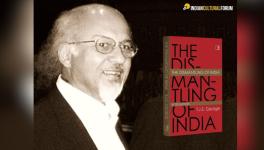Democracy, Distance, Difference, and Disrespect

UPENDRA BAXI explores the ideas of India by thinking about the four ‘D’s of Democracy.
—-
As we enter the year of celebrations of the Golden Jubilee of Indian independence, we need to ponder (in Sunil Khilnani’s words) how the ideas about India become the ‘idea of India’.
I deal here only with the transformative constitutional idea of India , which coincides and also conflicts with the cultural and civilizational ideas about India. State and law thus are a sphere of contractionary unity in which ideas of governance and development, justice, and rights, coalesce and conflict.
Dr B. R. Ambedkar, in his oft quoted words, said in ushering our Constitution that:
“On the 26th of January 1950, we are going to enter into a life of contradictions. In politics we will have equality and in social and economic life we will have inequality. In politics we will be recognising the principle of one man one vote and one vote one value. In our social and economic life, we shall, by reason of our social and economic structure, continue to deny the principle of one man one value. How long shall we continue to live this life of contradictions? How long shall we continue to deny equality in our social and economic life? If we continue to deny it for long, we will do so only by putting our political democracy in peril. We must remove this contradiction at the earliest possible moment or else those who suffer from inequality will blow up the structure of political democracy which is Assembly has to laboriously built up”.
Ambedkar did not develop any specific theory of contradictions but he believed in the institutional and ideological contradictions; what is more, he crystallized these in the Constitution as a creative force for future histories of emancipation. It is time that we rededicate ourselves to the jurisprudential foundations of constitutional law, interpretation, and theory
Four difficult ‘D’s- democracy, distance, difference and disrespect
All of us need to ponder this constitutional idea of India which also pursues another quartet. This comprises four difficult ‘D’s— democracy, distance, difference, and disrespect . In a sense, these remain the perennial stuff of performative politics. But these are also foundational.
The Indian Constitution celebrates the first three as political and ethical virtues and castigates the fourth ‘D’ as the ultimate denial of the first three ‘D’s.
Democracy is always governance at a distance , marked by the distinction between the public and private realm, where state power and executive must stop at the threshold of the private realm, whether of love, worship, or other ways of what Michel Foucault named as “the technologies of self”.
But this order of plurality (also known as zones of privacy or constitutional morality) knows its limits when it is based in disrespect for the other human beings or socio- cultural groups.
These limits are set by the Constitution and its values which outlaw discrimination while nourishing free choice within the private realm. However, the distance between the State and the citizen in daily life is not to be purchased at the cost of social discrimination. Rather, the Constitution disciplines and punishes discrimination in Articles 17, 23, 24 as the very foundation of governance at a distance.
And this notion is the very meaning of the constitutional celebration of difference– Isocracy. Respect for complex equality—is the basic virtue of all institutions sculpted by the constitution-makers, sculpted and nourished by succeeding generations of Justices, even in difficult times.
Democracy is the only form of governance that cultivates the arts and crafts of governance at a respectful distance and always aims at the achievement of what the philosopher John Rawls called “overlapping consensus” for “reasonable pluralism”.
He emphasized that this may be best achieved by respecting “constitutional essentials”, which have emerged in India, with and since, Kesavananda Bharati, as the “essential features” and the “basic structure” of constitutional ordering.
This is buttressed further by emanations of constitutional morality, placed higher in situations of rights-in-conflict , than social and public morality.
Disrespect in Democratic Constitutionalism
Disrespect is a more fundamental category in democratic constitutionalism than even the forms of dissent and protest. It is constituted by discrimination against the other and processes of prejudice that result in the denial of the rights of the other, in all their inter-relational complexity.
Demonization of the other is also a form of disrespect; as is indifference to democidal acts — acts of lethal sovereignty, like torture, cruel, degrading, or inhuman, punishment or treatment.
So are the social practices of violence and violation, to the point of brutality of violent social exclusion, and administration of social or the biological death.
In a sense, disrespect stands for degradation and humiliation of concrete other. Constitutional governance always requires respect for others, which the least understood preambulatory value when India that is Bharat was declared as a ‘republic’.
Disrespect is the worst form of future, when it is practised institutionally. For example, understaffing institutions and delaying due appointments may be a form disrespect resulting into institutional starvation.
This has been repeatedly brought to our attention by the Supreme Court: for example, as recently as August 6, 2021, the Supreme Court (per Chief Justice N V Ramana and Justice Surya Kant) had to point out that the situation cannot be allowed to “continue” when there were “19 vacant positions of presiding officers or the chairman in these tribunals and besides them, 110 and 111 posts of judicial and technical members respectively are vacant” and that it “appears that bureaucracy does not want these tribunals”.
Disrespect’ is writ large in the so-called problem of judicial delays, which I had analysed deeply in a chapter “Courts in Crisis” in my 1982 book. It gives me no satisfaction or joy to say that the structural crises continue as old wine in new bottles!
But the 75th year festivities celebrating the Constitution should now mark an executive-judiciary accord on a plan of action that ensures that at the outermost no case shall remain pending for final decision (if necessary, by the Apex Court) for more than a decade. This is as doable as the Indian sports team’s performance at the Tokyo Olympics!
The Republic and the Fraternity
On a more general plane, a republic means, of course the demise of imperial political rule and the real achievement of Independence. By definition, a ‘republic’ cannot be a monarchy, aristocracy oligarchy, mobocracy, or despotism, whether old or new.
A republic is consecrated in the name of ‘We, the people’ and is a congregation of free and equal citizens, who replenish all political and constitutional powers.
It is a living cluster of citizens who do not merely live in a society and civilization but also reshape and make these. A republic, thus, is an ongoing and live experiment, and experience, of democratic self-governance.
Allied, nay integral to the idea of a republic in the preambulatory and basic structure discourse is the preambulatory value of “fraternity”—another value that has been consigned to the unconstitutional dustbin!
Fraternity, roughly, stands for fellow feeling (and in major languages as sign of ‘brotherhood). Fraternity is indispensable to respect for the other. Both respect and fraternity united in Article 17, the lifeblood of the Constitution.
That Article stands for a new constitutional and republican we-ness. And it confronts at every step of our ways, state and social, of continual production of social difference to various everyday evils.
And we always ought to recall Ata Ul Haq Qasmi verse (which Ghazal Talat Mohmmed sang for Dilip Kumar 60 years ago in a Bollywood movie): Jahan bajti hai shehnai, wahan matam bhi hote hain (meaning roughly: Wherever trumpets blow, are also heard the voices and sounds of lamentation).
Contradictory to respect is also the fact that the constitution outlaws force and fraud in public and private relations. Neither the conduct of political practices nor of private relations are to be based on these “virtues” of this sort of “efficient” conduct.
Notions of free and informed consent are the basis of private law as notions of the “consent of the governed” are central to democratic rule. We assess the virtues of legal, political, market, and personal decisions through arguments about justifications for use of coercion and force.
Put another way, force and fraud never justify (legitimate) state or private conduct or social ordering.
Democratizing Democracy
Even so, the challenge before us not to find an alternative to democratic rule but rather to ‘democratize democracy’- how to deepen the sese of justice in all institutions of governance and development, how to forge a unity in diversity, and how to expand the frontiers of demosprudential constitutional faith.
Libraries-full of writings about what may constitute democratic legitimacy illustrate the difficulty of both the concept and measure. But we will do well to remember what the mystic poet Kabir said in a transcendental sense:
चलती चाकी देखकर , कबीरा दिया रोय ।
दुइ पाटन के बीच में , साबुत बचा ना कोय ॥
Roughly translated, “Kabir was all tears/ when he saw the movement of the grinding stones/ No one survives as a whole/ Between the two grinding stones”
(Upendra Baxi is Emeritus Professor of Law at the University of Warwick and Research Professor of Law and Distinguished Scholar in Public Law and Jurisprudence at the Jindal Global Law School, OP Jindal Global University. The views expressed are personal.)
Get the latest reports & analysis with people's perspective on Protests, movements & deep analytical videos, discussions of the current affairs in your Telegram app. Subscribe to NewsClick's Telegram channel & get Real-Time updates on stories, as they get published on our website.
























